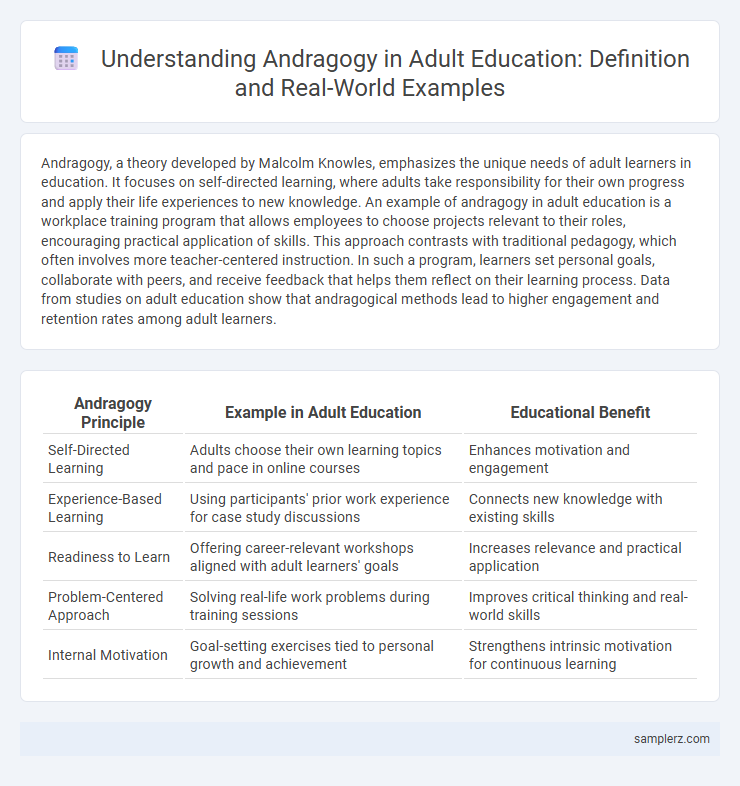Andragogy, a theory developed by Malcolm Knowles, emphasizes the unique needs of adult learners in education. It focuses on self-directed learning, where adults take responsibility for their own progress and apply their life experiences to new knowledge. An example of andragogy in adult education is a workplace training program that allows employees to choose projects relevant to their roles, encouraging practical application of skills. This approach contrasts with traditional pedagogy, which often involves more teacher-centered instruction. In such a program, learners set personal goals, collaborate with peers, and receive feedback that helps them reflect on their learning process. Data from studies on adult education show that andragogical methods lead to higher engagement and retention rates among adult learners.
Table of Comparison
| Andragogy Principle | Example in Adult Education | Educational Benefit |
|---|---|---|
| Self-Directed Learning | Adults choose their own learning topics and pace in online courses | Enhances motivation and engagement |
| Experience-Based Learning | Using participants' prior work experience for case study discussions | Connects new knowledge with existing skills |
| Readiness to Learn | Offering career-relevant workshops aligned with adult learners' goals | Increases relevance and practical application |
| Problem-Centered Approach | Solving real-life work problems during training sessions | Improves critical thinking and real-world skills |
| Internal Motivation | Goal-setting exercises tied to personal growth and achievement | Strengthens intrinsic motivation for continuous learning |
Understanding Andragogy: Key Principles in Adult Learning
Andragogy emphasizes the importance of self-directed learning, where adults take responsibility for their educational journey by setting goals and seeking resources independently. It incorporates experiential learning, allowing adults to draw from their personal and professional experiences to deepen understanding and apply new knowledge effectively. Facilitators in adult education create collaborative environments that respect learners' backgrounds, promoting critical reflection and problem-solving tailored to real-life contexts.
Real-World Applications of Andragogy in Adult Classrooms
Adult education often incorporates andragogical principles by emphasizing real-world applications, such as problem-solving activities related to workplace scenarios, which enhance practical learning and retention. In adult classrooms, learners actively engage with case studies that reflect their professional challenges, fostering critical thinking and immediate applicability of knowledge. This approach aligns with Malcolm Knowles' theory, highlighting the importance of experiential learning and self-directed study in adult education.
Collaborative Learning: Group Projects for Adult Learners
Collaborative learning in adult education often involves group projects that promote peer-to-peer interaction and shared problem-solving, aligning with andragogical principles emphasizing experiential and self-directed learning. Adult learners engage in real-world tasks that leverage their diverse experiences, fostering critical thinking and practical application of knowledge. This method enhances motivation and retention by creating a dynamic learning environment tailored to adults' unique needs and goals.
Case Studies: Andragogy in Corporate Training Programs
Case studies in corporate training programs demonstrate andragogy by emphasizing self-directed learning, practical problem-solving, and relevance to workplace challenges. Organizations like IBM and Deloitte implement modular training that allows adults to apply new skills directly to their roles, fostering deeper engagement and retention. These programs leverage real-world scenarios and peer collaboration to enhance experiential learning and professional development outcomes.
Self-Directed Learning: Empowering Adults to Take Charge
Self-directed learning in adult education emphasizes learner autonomy, allowing individuals to identify goals, select resources, and evaluate outcomes independently. This approach leverages intrinsic motivation and real-world experiences, enhancing retention and practical application. Empowering adults through andragogy fosters critical thinking and lifelong learning skills essential for personal and professional growth.
Problem-Based Learning: Practical Solutions for Adult Education
Problem-Based Learning in adult education emphasizes real-world challenges to enhance critical thinking and problem-solving skills among learners aged 25 and above. This approach encourages self-directed learning by presenting adults with practical scenarios relevant to their personal or professional lives, fostering deeper engagement and retention. Studies indicate that implementing Problem-Based Learning in andragogical settings increases learner motivation and application of knowledge in workplace contexts.
Technology Integration in Andragogical Practices
Integrating technology in andragogical practices enhances adult learners' engagement by providing interactive platforms such as virtual simulations, online forums, and adaptive learning software tailored to diverse learning needs. Digital tools like mobile applications and multimedia resources enable self-directed learning, fostering critical thinking and collaboration among adults. Employing technology in andragogy supports flexible learning schedules and real-time feedback, which are essential for adult education success.
Experiential Learning: Hands-On Activities for Adults
Experiential learning in adult education emphasizes hands-on activities that engage learners in real-world problem-solving and practical applications of knowledge. Adults benefit from interactive workshops, simulations, and projects that allow them to apply concepts directly, fostering deeper understanding and retention. This approach aligns with Malcolm Knowles' principles of andragogy by recognizing adults' prior experiences as valuable resources in the learning process.
Reflective Practice: Encouraging Critical Thinking in Adult Learners
Reflective practice in adult education involves guiding learners to analyze their experiences and draw meaningful conclusions, fostering critical thinking skills essential for personal and professional growth. Techniques such as journaling, group discussions, and case studies promote active reflection, enabling adults to connect theory with real-world application. This approach enhances self-directed learning, allowing adults to adapt knowledge to diverse contexts effectively.
Assessment Techniques Aligned with Andragogical Approaches
Assessment techniques in adult education often emphasize self-assessment, peer evaluation, and real-world application projects, aligning with andragogical principles that prioritize learners' autonomy and practical experience. Formative assessments such as reflective journals and problem-solving tasks encourage critical thinking and self-directed learning, fostering deeper engagement with the material. These approaches enhance motivation and help adults integrate new knowledge with prior experience, supporting effective lifelong learning outcomes.

example of Andragogy in adult education Infographic
 samplerz.com
samplerz.com